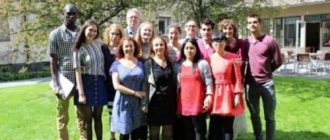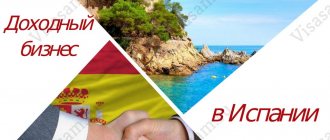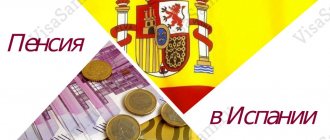It’s worth going to Spain not only for the works of Gaudi, Velazquez and the golden beaches of the Costa Dorada. This country offers high-quality education, which is recognized in other European countries and is inexpensive. Anyone who can pay for the entire course of study or applies for a scholarship for foreign students can receive a diploma from a Spanish university. Studying in Spain for Russians is a great opportunity to gain knowledge, new friends and a prestigious job in the future.
Differences between the Spanish and Russian education systems
The peculiarity of Spanish education primarily lies in the individual approach to students - the educational institution adapts to the needs of its students. The educational process is structured in such a way that even poorly prepared students can master the curriculum.
Only 60% of children and adolescents study in public educational institutions; the rest attend either private or regional educational institutions funded by the state.
The responsibility to help the child master the school curriculum and support him in solving possible problems rests entirely with teachers. Parents are not required to attend meetings, check homework and prepare children to participate in various activities - teachers do this.
This also applies to Spanish universities - all necessary information and links to online materials are provided to students at their place of study.
Disadvantages of Spanish Education
The disadvantages of Spanish education include low prestige, a narrow selection of English-language programs, a wide range of prices and differences in approaches to education in the regions, as well as excessive politicization and the imposition of religious dogmas.
Expert opinion
Maksim
He has been actively traveling around Spain for the last 4 years.
Ask a Question
I also suggest reading the article on how to apply to a university in Spain link.
Preschool education in Spain
Preschool education in the Kingdom of Spain includes two stages: from 0 to 3 years and from 3 to 6 years, but is not compulsory. Studying can take place in either a private or public preschool institution. During the day, children are taught, fed, and much attention is paid to educational games.
A child can enter such an institution regardless of gender, religion or race. The kindergarten accepts not only children born in Spain, but also those whose parents came to the country from abroad.
If the number of places in a kindergarten is limited, preference is given to those children whose family members already attend or work in it.
The average cost of training ranges from 200 to 500 euros per year, but some parents prefer to hire an individual teacher, whose services range from 10 euros/hour.
Grants and scholarships for students in Spain
A foreign student can count on receiving a scholarship (monthly) or a grant (one-time payment). This money will be enough to pay for housing, education, and health insurance. But while in immigration, it is difficult to get a grant or scholarship. It is much easier in this regard for Spanish residents.
All scholarships are divided into two types depending on who is funding them (state or private program). The easiest way for students from the CIS countries is to get a private scholarship, which is expressed in the form of a discount on tuition.
Secondary and secondary specialized education
Secondary education is compulsory for all children and adolescents aged 6 to 16 years. The state at the legislative level guarantees free secondary education and obliges parents, regardless of citizenship, to provide their child with the opportunity to study on an equal basis with their peers.
For their part, parents must pay for meals, uniforms, textbooks, excursions and other unforeseen expenses that arise during the study process.
As of 2021, tuition fees at private Spanish colleges range from 500-600 euros per year plus the cost of study materials.
Russian children are freely accepted into both private and state educational institutions. However, some colleges require entrance tests to determine the mental abilities of a prospective student.
An official Russian-language school exists in Madrid at the Russian embassy, and there are also a large number of private schools. Find out more about what schools there are in Spain.
graduate School
The higher education system in Spain is one of the most conservative and is represented by universities of three categories - public, private and religious institutions of higher education. University education in universities of any type is paid, but the prices are so reasonable that it can easily be considered public. In addition, there is a convenient system of grants, scholarships and a number of international exchange programs for students. In general, in Spain, the cost of education, the development of curricula and programs are within the competence of the university administration only.
The conditions for admission to higher school are the results of entrance state examinations, consisting of writing an essay, passing tests in Spanish and foreign languages, history or philosophy, as well as four compulsory or elective disciplines. Education in universities takes place in the state language. For foreign citizens, in order to improve their knowledge of Spanish, various preparatory language courses are available.
Higher education in Spain is part of the pan-European Bologna system, which includes its division into three degrees:
- Bachelor (grado) - duration of study is 4 years with the possibility of obtaining any specialty.
- Master (master) - acquisition of a narrow specialization in a specific field and preparation for research activities. Duration of training is 1–2 years.
- Doctor (doctorado) - involves scientific activity. It is analogous to graduate school with a duration of study of 1−2 years.
The structure of universities in Spain is represented by colleges, university faculties, schools and higher technical schools. Also, in most universities in the country there are medical faculties that provide the opportunity to undergo full-fledged training in this profile. To obtain medical education in Spain, an applicant must provide a certificate of secondary education and pass entrance exams in a foreign language.
In addition to regular higher education, the country has many business schools offering postgraduate training. For admission to postgraduate education programs, you only need to present a university diploma. Foreigners are required to confirm their diploma in Spain. This can be done at the Ministry of Education.
Higher education in Spain
To enroll in a bachelor's or master's degree at one of the Spanish universities, a Russian applicant must choose an educational institution and pass four entrance exams provided for foreigners:
- in Spanish;
- stories;
- German, French or Portuguese;
- profile test.
As for scholarships and grants, preference is given to Spaniards or Latin Americans in their distribution.
Russian citizens will not be able to obtain higher education for free even if teaching is conducted in Russian or English.
In particular, educational programs in Russian and English are offered by Estudio Sampere in Madrid, the Catholic University of Murcia, the Malaga Institute in Malaga, and the European University in Barcelona.
The cost of training varies depending on the direction. Those who plan to obtain a legal education, study philology or management should count on 1.5-10 thousand euros per year.
Training in technical specialties is valued higher - here a year of study can cost from 3.5 to 14 thousand euros per year.
Best Universities in Spain
There are 50 public and 20 private higher education institutions in Spain. The admission campaign is carried out simultaneously in them, however, the rules for admission to private universities are less strict.
Those who plan to receive higher education abroad should take care in advance of obtaining a student visa and apostille of all necessary documents.
The academic year in Spanish universities for future bachelors begins in late September, and masters begin classes in October.
The oldest and most respected institutions of higher education in the country are the University of Salamanca, the Complutence de Barcelona and the University of Madrid.
Education in them is the most expensive, and they accept mainly local applicants and students coming to the country on exchange.
Almost every university has research, laboratory and sports complexes, and cultural events are held.
The most famous universities in Spain
Pricing policies in private universities and government institutions differ greatly. As an example:
- to study at the Faculty of Medicine in Barcelona, you need to pay from 2372 euros annually. In the southern parts of the country (regions of Malaga, Seville, etc.) tuition fees at the same faculty will start from 757 euros per year;
- Tuition at the Faculty of Chemistry in Barcelona for immigrants is 2146 euros, in Andalusia - 757 euros.
The cost of studying at a public university in Spain for students from other countries exceeds the price for citizens of the European Union. Non-state universities in Spain have set the same cost for both foreigners and citizens of the country.
The most expensive university in Spain is San Pablo in Madrid. The price of studying at the Faculty of Medicine starts from 18,745 euros annually. After 3 years, the amount decreases to 11,900 and remains at this level until the end of study.
Based on reviews from Russian students studying at foreign universities, we can rank the most popular universities:
- Andalusian.
- Santiago Compostela.
- Valladolid.
- Burgos.
- Alicante.
The cost of studying at these universities per year starts from 757 euros and can reach 3560 euros. Taught in either English or Spanish.
The range of tuition prices is impressive. But they depend directly on the prestige of the educational institution and how many educational programs it implements.
University of Cordoba, Andalusia
Language courses in Spain
Those who plan to study Spanish on courses in Spain should understand that only teachers who are native speakers can provide the highest level of training. In particular, the best language courses operate in cities such as Barcelona, Seville, Mallorca and Madrid.
In order to be able to take courses, you must pass a language test to determine your level of Spanish proficiency.
The duration of the courses is from a week to a year, and classes can be either individual or group.
The cost of training for the courses includes accommodation in a hotel or host family, training and preparation for passing the language exam. Weekly courses cost 250-400 euros (depending on the prestige of the educational institution and place of residence), annual courses cost 2-4 thousand euros.
Courses are divided by focus: these can be business courses, preparatory courses for entering a university, or amateur ones.
What is Selectividad?
To enter a university in Spain, both Spaniards and Russians need to pass an entrance exam, held twice a year. There are currently three types of testing in the country:
- PAU (Pruebas de Acceso a la Universidad) - a single examination test for all Spaniards, as well as foreigners, who want to study in Barcelona and Valencia;
- PCE (Pruebas de Competencias Específicas) - an analogue of PAU for foreign applicants, conducted by the National University of Distance Education (UNED), it can be taken in absentia;
- EbAu (Evaluación de Bachillerato para el Acceso a la Universidad) is another type of PAU most often requested by Madrid institutions.
PAU, formerly called Selectividad, like its other variations, is always conducted in Spanish and consists of two parts: compulsory and optional. In the first part, applicants undergo a language test and a test of basic knowledge in specialized disciplines, depending on the chosen specialty: for example, future engineers take mathematics, physics and drawing, and to study at the Faculty of Medicine, “savvy” in chemistry and biology is required. The overall score for admission is based on the results of the tests passed and the average score of the school certificate. If a student wants to improve his chances of being accepted, he can take several other electives.
It is worth noting that it is very difficult to successfully pass the test without preparation, so many Spaniards take special courses for admission. Typically, such programs last about a year, although recently intensive courses lasting from one to three months, as well as individual classes, have become increasingly popular.
Exchange program training
Since 1987, students from all over the world can study in EU countries under an exchange program. This program provides for partnerships between universities in different countries, awarding training grants to students on the basis of a competition. To participate in the competition, students submit applications accompanied by copies of grade books, diplomas, university recommendations, and certificates of passing a language proficiency test.
All students participate in this program on equal terms, meaning Spanish-speaking students do not have special privileges. Applications are allowed to be submitted to three universities at once, but if the commission’s review of the application is positive, it will be possible to continue studying at only two of them.
Every year, more than 30 thousand graduates of non-European educational institutions receive a grant to study in Spain, while about 10% of them have the opportunity to receive a scholarship for exceptional abilities.
Diplomas and degrees
The following diplomas and degrees are accepted in Spain:
| well | duration | degree |
| Diplomatura (1 cycle) | 3 years | Diplomado, or Arcquitecto Tecnico, or Ingeniero Tecnico |
| Licenciatura (cycle 2) | 2-3 years | Licenciado, or Arquitecto, or Ingeniero |
| 3 cycle | 2 years | Doctorado |
Equivalents of Spanish degrees to the generally accepted world system:
Bachelor
Bachelor's degrees are equal to the three main degrees that university students in Spain receive upon completion of the first cycle (stage) of study:
- "Arguitecto Tecnico" is a degree awarded to students studying only in the field of architecture;
- "Ingeniero Tecnico" - a degree awarded to technical students;
- "Diplomado" is a degree awarded to students studying in all other areas.
master
The Master's degree is a qualification awarded upon completion of the second cycle of study in Spain. Depending on the area of study, this may be:
- Architect (Arcuitechto)
- Engineer (Ingeniero Superior)
- Licensee
Master's Researcher
In Spain, it usually corresponds to a certain qualification - “Master”, “Diplomado”, “Experto”, etc. It is awarded after completion of the third cycle of study in Spain and is determined by the university that organized the course.
Doctor
In Spain it is called the same as in most developed countries - the degree of Doctor. It can be obtained by reaching the third level of higher education in Spain. After two years of study, it is necessary to submit the prepared dissertation for consideration by the academic council.
Duration of study : 3-6 years The academic year lasts from October to June Study schedule : the academic year consists of 2 semesters
FAQ
| Is it possible to study in Spain remotely and at the end of the studies receive a full-fledged diploma from a European university? | Yes, you can. An applicant can choose either completely remote learning or combine online practices with attending classroom classes. In Madrid there is a distance learning university called UNED, which accepts students exclusively for remote higher education. |
| Is it possible to enter a Spanish university immediately after 9th grade or only after 11th grade? | Possible only after 11th grade. True, the process of preparing for the entrance campaign will be difficult: the future applicant will have to master the Spanish language at level B1, receiving a DELE certificate, and pass the Selectividad, an exam to assess the level of knowledge acquired at school. |
| Are scholarships available to Russian students? | Over the past few years, funding for international students has decreased significantly. To find out more about available grants and scholarships, contact the administration of the university of your choice. Discounts on tuition and fees for low-income students are found not only in public, but also in private universities. |
Admission to Spanish universities: requirements for foreign applicants
Immigrants are given the opportunity to undergo training courses. The longest ones are those that train specialists in the field of medicine and exact sciences (for example, mathematics). As in Russia, to master the profession of a doctor, longer training is required. When the student finishes studying the subjects, after passing the exams he will receive a certificate and is guaranteed to enter the university of his choice.
Since 2014, the process of entering universities for Russians has been simplified by the fact that the provision of a school certificate with Unified State Examination results obtained in Russia is equivalent to the exams taken by Spaniards.
Work while studying at a university in Spain
Officially in Spain, foreign students are allowed to work while studying.
Conditions for obtaining a Spanish study visa
The number of documents and the process of obtaining a visa depend on the period for which you are going to study. In any case, to obtain a short-term student visa or a long-term student visa, an invitation from the educational center, drawn up in a special form, confirmation of enrollment in the course, indicating the type of accommodation and course, is required. A medical certificate, a police clearance certificate and documents confirming payment for the course are also required. Initially, the Consulate issues a visa to enter Spain, which is valid for 3 months. During this time, the student must submit documents for a residence permit. In this case, the residence permit is extended for the entire period of occupation.
Pros and cons of studying in Spain
Naturally, before deciding to educate your child in Spain, you need to once again weigh all the pros and cons.
| Pros of studying in Spain | Disadvantages of studying in Spain |
| The child finds himself in an interesting multicultural environment, in a country with ancient history. | Studying in Spain is not as prestigious as, for example, in England or France. |
| Relatively low cost of training. | Lack of English-language training programs. |
| High likelihood of receiving educational scholarships and grants. | Separation of education from the professional sphere, lack of real production practice. |
| Compliance of Spanish education with international standards. | Insufficiently developed connections between educational institutions in Spain. |
| Good material and technical base of all educational institutions. | Lack of uniform educational standards in the state (each university and college has its own program, which is significantly different from others) |
| Well-developed connections between Spanish educational institutions and educational institutions in other European countries |










